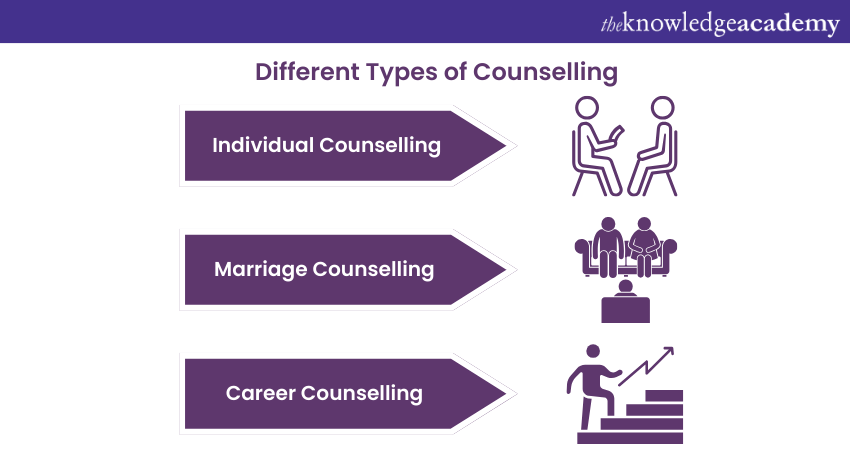A Comprehensive Guide to the Various Sorts Of Coaching and Their Influence
Counseling encompasses a range of healing techniques, each made to satisfy distinct psychological health requirements. From the structured techniques of Cognitive-Behavioral Therapy to the understanding nature of Person-Centered Treatment, these methods offer unique pathways to personal growth. Family therapy and Dialectical Habits Treatment offer extra structures for recovery, while group therapy cultivates neighborhood assistance. Recognizing these varied approaches can illuminate their extensive influence on private health. What continues to be to be explored are the details of each method.

Comprehending Cognitive-Behavioral Therapy (CBT)
Although numerous restorative approaches exist, Cognitive-Behavioral Therapy (CBT) stands apart due to its organized, goal-oriented nature. This form of therapy is based upon the property that ideas, feelings, and habits are interconnected, and by transforming adverse idea patterns, individuals can modify their emotional reactions and activities. CBT utilizes different techniques, such as cognitive restructuring, which helps customers recognize and test distorted beliefs. Behavior activation urges interaction in pleasurable tasks to battle clinical depression.
Generally, CBT is a temporary therapy, usually lasting in between 12 to 20 sessions, making it obtainable for those seeking fast outcomes. Its efficiency has actually been well-documented in dealing with stress and anxiety disorders, depression, and other mental health and wellness issues. The therapist's function is to lead customers with workouts and homework assignments, fostering self-awareness and advertising lasting coping strategies. This useful approach encourages individuals to take control of their mental well-being, inevitably bring about enhanced life contentment.
Discovering Person-Centered Therapy
Person-Centered Treatment, established by Carl Rogers, uses a contrasting technique to Cognitive-Behavioral Treatment by highlighting the customer's subjective experience. This restorative model prioritizes the person's viewpoint, cultivating an environment of compassion, unconditional favorable respect, and credibility. By enabling customers to discover their sensations and thoughts without judgment, therapists promote personal development and self-discovery.
The core tenet of Person-Centered Treatment is the belief that people have the intrinsic capacity for self-healing and personal development. In this setting, the specialist functions as a helpful guide as opposed to a directive authority, motivating customers to take charge of their very own journey. This technique is especially efficient for those coming to grips with concerns such as low self-confidence, anxiousness, or clinical depression, as it encourages them to face and understand their emotions. Ultimately, Person-Centered Therapy grows a solid restorative partnership, promoting trust and visibility necessary for meaningful modification.
The Function of Household Treatment in Recovery
Family treatment works as an important part in the recovery process for people and their partnerships. This healing approach focuses on boosting communication, fixing disputes, and cultivating much deeper links among member of the family. By addressing inefficient dynamics, family members treatment motivates each participant to share their ideas and sensations in a risk-free atmosphere, advertising understanding and compassion.

The influence of family treatment expands past the sessions, as enhanced connections can result in boosted emotional wellness for all entailed. On the whole, family therapy plays an essential role in healing by cultivating unity, durability, and common assistance among member of the family, ultimately leading them towards a much healthier, extra fulfilling life together.
Unloading Dialectical Behavior Modification (DBT)
Building on the structure of therapeutic strategies that boost emotional wellness, Dialectical Behavior modification (DBT) offers a structured framework for check here individuals having problem with extreme emotions and behavioral difficulties. Established by Marsha Linehan, DBT integrates cognitive-behavioral strategies with mindfulness methods, aiming to help clients manage frustrating sensations and boost social performance.
The therapy is especially valuable for those diagnosed with Borderline Individuality Condition yet is also relevant to a variety of other psychological health concerns. low cost therapy. DBT includes individual therapy sessions and skills training teams, concentrating on four essential capability: mindfulness, distress tolerance, feeling regulation, and interpersonal performance
The Advantages of Group Counselling Sessions
While specific therapy gives valuable insights, team therapy sessions offer distinct benefits that can significantly boost the restorative experience. One crucial benefit is the sense of neighborhood that emerges among participants. Individuals commonly locate comfort in sharing their experiences with others dealing with comparable difficulties, promoting a supportive environment that reduces feelings of seclusion.
Furthermore, team sessions encourage varied perspectives, enabling individuals to learn from each other's coping techniques and understandings. This collective knowledge can bring about enhanced problem-solving capabilities and a broader understanding of personal problems.
Additionally, group therapy commonly promotes responsibility, as participants motivate each other to seek their goals and comply with their commitments. The cost-effectiveness of team treatment makes it an available choice for several individuals seeking assistance. Overall, the joint nature of team therapy sessions can greatly enhance the therapeutic trip.
Regularly Asked Concerns
What Credentials Do Therapists Need to Exercise Therapy?
Specialists usually need a pertinent degree in psychology or counseling, along with monitored clinical experience. Additionally, they need to acquire proper licensure or qualification to practice legally, guaranteeing adherence to specialist requirements and honest guidelines.
Just how Do I Pick the Right Sort Of Treatment for Me?
Choosing the right type of treatment involves examining personal needs, checking out various strategies, thinking about specialist specialties, and looking for recommendations. Recognizing individual goals and choices can greatly boost the efficiency and complete satisfaction of the therapeutic experience.

Are Online Therapy Sessions as Effective as In-Person Ones?
The effectiveness of on-line counseling sessions contrasted to in-person ones often depends on individual preferences and circumstances. Research shows that both techniques can produce positive end results, though some may locate better convenience in face-to-face interactions.
For How Long Does Counseling Commonly Last?

What Should I Expect During My First Therapy Session?
During the first counseling session, clients can expect an intro, conversation of their concerns, establishment of objectives, and an overview of the counseling procedure - relationship therapy. This initial conference intends to construct relationship and warranty comfort